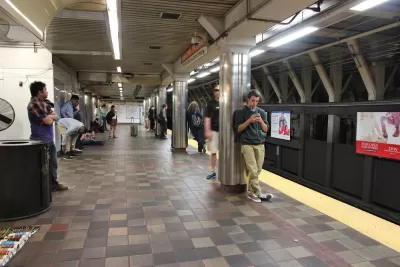A Twitter account is broadcasting its findings about the mood of transit riders in Boston, in real time.

Yesterday, I spent a total of about 20 minutes (unofficial tally) waiting on the Metro 201 bus in Los Angeles waiting to turn left at unprotected left turns while cars clogged intersections and cut in front of the bus in the line to turn.
I did another quick, unofficial tally, and estimated that I had spent 10,000 hours on buses waiting to turn left—10,000 hours of deliberate practice being Malcolm Gladwell's theoretical threshold for world-class skill (a theory that has since been debunked).
Needless to say, I wasn't in a good mood.
This morning I felt a little better, knowing that someone out there understands the pain (and joy, of course) of transit users.
"A new Twitter account called @MBTA_Mood, which has no affiliation with the MBTA, has been analyzing the overall mentality of some MBTA riders based solely on their tweets, and then regurgitating the information back to the general public on social media," reports Steve Annear.
So, for example, yesterday at 9 am, about the same time I would eventually be waiting for the 201 to turn left at 6th and Vermont in Los Angeles from a duration of time easily longer than five minutes, the account tweeted: "There was a fall in rider mood over the past hour. Analyzed 68 tweets, with 52.41% feeling Sadness. #MBTA #MBTAMOOD."
The creator of the Twitter account wishes to stay anonymous, but the tool used to generate the mood analytics is not: the IBM Watson Tone Analyzer, "which uses linguistic analysis to detect emotion in text and 'predict whether they are happy, sad, confident, and more,' according to IBM’s website."
FULL STORY: This Twitter account tells you the general mood of MBTA riders by the hour

Maui's Vacation Rental Debate Turns Ugly
Verbal attacks, misinformation campaigns and fistfights plague a high-stakes debate to convert thousands of vacation rentals into long-term housing.

Planetizen Federal Action Tracker
A weekly monitor of how Trump’s orders and actions are impacting planners and planning in America.

In Urban Planning, AI Prompting Could be the New Design Thinking
Creativity has long been key to great urban design. What if we see AI as our new creative partner?

King County Supportive Housing Program Offers Hope for Unhoused Residents
The county is taking a ‘Housing First’ approach that prioritizes getting people into housing, then offering wraparound supportive services.

Researchers Use AI to Get Clearer Picture of US Housing
Analysts are using artificial intelligence to supercharge their research by allowing them to comb through data faster. Though these AI tools can be error prone, they save time and housing researchers are optimistic about the future.

Making Shared Micromobility More Inclusive
Cities and shared mobility system operators can do more to include people with disabilities in planning and operations, per a new report.
Urban Design for Planners 1: Software Tools
This six-course series explores essential urban design concepts using open source software and equips planners with the tools they need to participate fully in the urban design process.
Planning for Universal Design
Learn the tools for implementing Universal Design in planning regulations.
planning NEXT
Appalachian Highlands Housing Partners
Mpact (founded as Rail~Volution)
City of Camden Redevelopment Agency
City of Astoria
City of Portland
City of Laramie





























